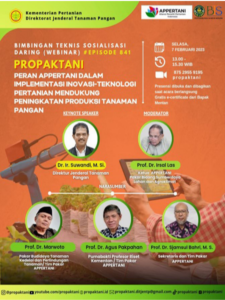Online Socialization Technical Guidance (WEBINAR) #EPISODE 841 PROPAKTANI And APPERTANI

THE ROLE OF APPERTANI IN THE IMPLEMENTATION OF AGRICULTURAL INNOVATIONS TO SUPPORT THE INCREASE IN FOOD CROP PRODUCTION
APPERTANI Non-Profit Scientific Organization was established by the Ministry of Agriculture Professor Research Communication Forum, carrying the tag line “Agricultural Innovations and Solutions” got the opportunity to organize Webinar Episode 841 Propaktani to outline its role in the Implementation of Agricultural Innovations to Support Increasing Food Crop Production. As the moderator of this webinar episode is Prof. Dr. Irsal Las, Chairman of APPERTANI who an Expert in the field of Land Resources and Agroclimatic.
The Secretary of APPERTANI who an Expert Team Prof. Dr. Sjamsul Bahri, M.S. explained that this organization participates in bringing up Innovation-Technology and the role of agricultural research and development, human resources in the transfer of agricultural science and technology, coaching and accelerating the process of adopting agricultural technology innovations to users. More about APPERTANI he explained: 1) background, 2) mindset, 3) objectives functions and roles, 4) vision, mission, 5) members, administrators, advisors, supervisors and expert team, 6) scope of activities and patterns of cooperation and 7) activities 2021-2023. From 2021 to early 2023 APPERTANI has been and is being implemented 12 domestic and foreign cooperation activities
Indonesia has declared soybean self-sufficiency since 2005, until now it has not been successful after several changes in the target of self-sufficiency. Prof. Dr. Marwoto Expert in Soybean Crop Cultivation and Plant Protection, APPERTANI gave an explanation on seed production and selection to increase soybean production. Failure to achieve production targets so far is caused by never achieving the target area of planting area and soybean planting recommendation technology has not been fully implemented. Those causes the target of harvest area and productivity not to be achieved, in addition to the availability of high-quality variety seeds is not enough. The provision of seeds with JABALSIM seed system has been developed to face the challenges of competition between food commodities in multicultural planting patterns. Presentation focuses on production technology, including the production of quality soybean seeds in accordance with the environment and the selection of certified soybean seeds, high yield, agroecology-specific adaptive as well as in accordance with market demand.
Since the outbreak of the war between Russia and Ukraine, the scarcity of an-organic fertilizers has been increasingly realized due to the inhibition of raw material supplies. Prof. Dr. Agus Pakpahan retirement of the Ministry of Agriculture Research Professor who is also an APPERTANI Expert, explained the potential of black soldier flies (BSF), organic waste and microbes for the development of biofertilizers and environmentally friendly organic fertilizers, based on the basic principles of the work of natural systems in a cycle. The cycle occurs due to the work of the decomposer which is highly dependent on the availability of sufficient C-organics in the soil. Organic waste left over from agriculture, households, industries, institutions and other resources is a very high-value resource.
Black soldier fly is one of the insects that has a very high potential to produce a variety of high-value products including biological fertilizers and organic fertilizers. The maggot liquid fertilizer experiment in the Bunga Mayang Sugarcane Plantation area was 60 liters/ha and used a 50% NPK dose instead of the usual recommended dose, resulting in the same level of productivity. From the point of production cost, reducing the cost by 50% of NPK fertilizer purchases (c.a. 2 million IDR / ha at the time of the study), reducing pollution due to inorganic fertilizers and improving soil fertility. The use of this circular economy model not only produces environmentally friendly production inputs but also overcomes overall environmental problems due to the accumulation of organic waste and creates jobs, production stability, income, and the sustainability of the overall living ecosystem.


